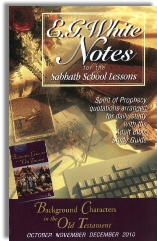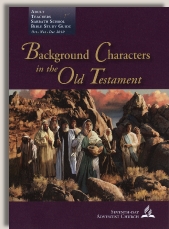|
||||||||||||||
Commentary on "Gehazi: Missing the Mark"
Day 1: Sabbath Afternoon, December 11, 2010 - Introduction
Overview
“Key Concept for Spiritual Growth: God calls us to be servants guided not by earthly enticements but by spiritual commitment to God and others.” (Adult Teachers Sabbath School Bible Study Guide, Oct. Nov. Dec. 2010, page 141)
Problems
Gehazi’s story is one of those warts-and-all sagas so common in the Bible and so important to our spiritual growth.
This week’s lesson in the Seventh-day Adventist quarterly offers some good analysis, reasonable explanation and potentially good application. All of us can learn from Gehazi’s failure. Truthfully, all of us probably already have experienced Gehazi’s failure at least once in our lives. I appreciate how the author of this lesson keeps bringing Gehazi’s situation into our context.
However, as I read through the quarterly I was uncomfortable. To be fair, I read all Adventist literature with a skeptical eye, but I do so because I was such a “true believer” for so much of my life. I learned the hard way that one can never turn the brain off by simply accepting everything a denomination or favorite pastor or parent or teacher says or writes. (I hope whoever reads this commentary does the same with me. I am not the truth. The best I can do is point you to Jesus.)
As I read through the lesson a third time I concentrated on the quote listed above. That I missed it the first two times through is an indication of how subtle error can be.
Simply put, our ability to serve, indeed our ability to live any part of the Christian life, has nothing to do with our “spiritual commitment to God and others.” This statement echoes EGW’s famous statement in Steps to Christ (page 47): “What you need to understand is the true force of the will…”
Commitment is something I do. Taking away sin and restoring eternal life is what Jesus does. Ironically, when you allow Jesus to do what He wants within you, then you will find that you are committed to something beyond yourself. Thinking about commitment, or attempting to be committed, first always will result in failure.
The obvious question is, “Isn’t ‘allowing’ Jesus to do something the same as exercising my will, my power of choice?” Yes, it is, but the initiate-response process is completely reversed. When I commit to God I am initiating to Him, and, by definition, I expect a response from Him. He does not respond to me, because doing so would make Him less than me. However, when He initiates to me and I choose to respond by allowing His initiation to continue, then my life is changed forever.
This is the difference between law and grace. Law is about running to God and saying, “Did you see that? I did it right! I may have gotten all that other stuff wrong, but I got that one right! Did you see? Did you see?” God’s ‘response’ to this? “Be perfect as I am perfect.” Failure!
Grace is about God running to me and saying, “Sin no longer separates you from Me. I took it away. Death can by swallowed whole by life, if you’d accept this present I got for you. You don’t know it yet, but it will fit you perfectly. It always does. Please take it.” At this point, if I choose to say Yes then the very life of Jesus (Who is fully God) fills me. This Life, the Holy Spirit, indeed fits perfectly. Glory!
This is not nit-picking. Understanding the difference is critical to knowing Jesus, the real Jesus Who walked in perfect dependence on the Father, Who on the cross became sin for me so that I could become righteous in Him and Who rose from the dead in complete victory over death to offer His own life to me.
Gehazi lived under the Mosaic covenant with its wonderful pictures and promises of the coming Messiah. His faith could have been based on the guarantee of God’s word regarding the Messiah, but he chose to go his own way, to define success in his own terms. Thankfully, because God always made certain that truth was written in the Bible, we can learn from his failure.
Here is the teacher’s quarterly suggestion for an opening exercise with the class:
Many states have banned the use of cellular phones by motorists while driving because of safety considerations. What philosophy undergirds these restrictions? Discuss how driving distractions compromise safety, endangering pedestrians and other motorists. Make a spiritual application of your discussion. Analyze aspects of contemporary culture. Which ones interfere with our spiritual vision? Which serve as distractions to our divine assignments? Which distort our spiritual focus on service? How can Christians keep earthly enticements from sidetracking their spiritual development and servant focus? What consequences result from failing to serve? (Adult Teachers Sabbath School Bible Study Guide, Oct. Nov. Dec. 2010, page 141)
What’s wrong with this exercise? It assumes that we need law to keep us from killing ourselves and others. All a law can do is recognize a dangerous situation foisted on society by selfish people and stipulate penalties for engaging in the selfishness. The law is powerless to prevent the selfishness in the first place.
Again, passing a law is an admission of failure. It is the epitome of self-effort. There has never in the history of the world been a more legalistic society than ours, and yet our society is tearing itself apart in spite of all its laws.
Summary
- This week’s lesson has much to offer.
- Undergirding all Adventist theology is the idea of self-effort and commitment. Following through with Adventist thought nearly guarantees that Gehazi’s failure will be yours.
Copyright 2010 BibleStudiesForAdventists.com. All rights reserved. November 15, 2010. This website is published by Life Assurance Ministries, Glendale, Arizona, USA, the publisher of Proclamation! Magazine. Contact email: BibleStudiesForAdventists@gmail.com.
The Sabbath School Bible Study Guide and the corresponding E.G. White Notes are published by Pacific Press Publishing Association, which is owned and operated by the Seventh-day Adventist church. The current quarter's editions are pictured above.
Official Adventist Resources
Standard Edition Study Guide Week 12
Teacher's Edition Study Guide Week 12
Easy Reading Edition Study Guide Wk 12
Search the Complete Published Ellen G. White Writings


